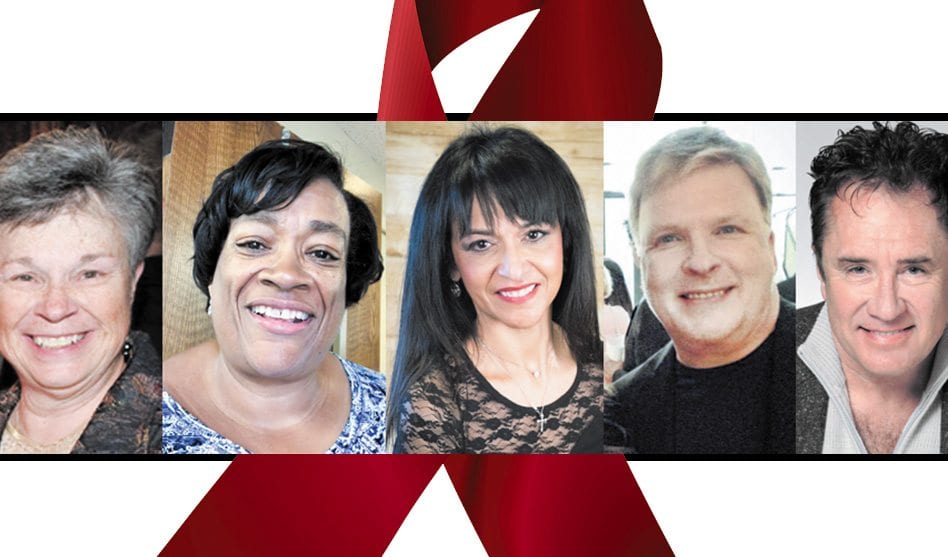Carol West, Dawn Shephard, Dr. Di Ann Sanchez, Scott Green and Barry Phillips
AOC’s Evening of Hope gala aims to raise vital funds while ‘unmasking the stigma’ around HIV/AIDS
Tammye Nash | Managing Editor
nash@dallasvoice.com
“With hope, anything is possible.”
That is the theme of this year’s Evening of Hope gala dinner benefitting AIDS Outreach Center in Fort Worth. And organizers say this year’s masked ball event is aimed at helping “unmask the stigma surrounding HIV and AIDS.”
Evening of Hope takes place Saturday, May 19, from 6:30 p.m.-midnight at the Hilton Fort Worth, 815 Main St. Single tickets are $200, available online at AOC.org, and include admission and dinner for one.
Co-chairs for this year’s event are Dr. Di Ann Sanchez and Scott Green. Emmy winner Barry Phillips is the emcee for the evening, and a group from the Turtle Creek Chorale will perform, with Trey and the Tri-Tones ending the evening with music for dancing.
The Rev. Carol West, pastor of Celebration Community Church, will be the keynote speaker for the evening, and she will receive the Individual Service Award. Samaritan House, which provides housing and resources for people living with HIV/AIDS, will receive the Community Service Award. Dawn Shepard will also speak at the dinner, sharing her personal story of living with HIV/AIDS.
Green said organizers chose West as keynote speaker and as the Individual Service Award recipient based on her inspirational story and the years she has dedicated to serving the LGBT and HIV/AIDS communities.
“About a year or so ago, I heard Carol speak at a private gathering of a group formed to combat homophobia in organized religion,” Green said.
“And in the early days of the HIV/AIDS epidemic here in North Texas, she worked for [what was then Metropolitan Community Church of Dallas and has since become Cathedral of Hope UCC], ministering to people with HIV and AIDS. She was there for people when their family and friends wouldn’t even go to see them.
“Her story really moved me,” the Evening of Hope co-chair and AOC advisory board vice president continued. “What she did, what she does now — it goes to the heart of what we are called to do here at AIDS Outreach Center. It speaks directly to our mission,” which is “to serve people living with or at risk for HIV with dignity and respect.”
Shannon Hilgart, executive director of AOC, added that West “used to be employed here [at AOC] for a couple of years, as director of prevention services.” And her church, Celebration Community Church, has filled six tables at the Evening of Hope. “We have just gotten such an amazing outpouring of love and support from Celebration,” Hilgart added.
Samaritan House was established in 1991 to provide housing to persons living with HIV/AIDS, at the time when AIDS was a terminal diagnosis that left people needing intensive medical care and support during their final days. Over the years, as advances in medicine have turned HIV/AIDS into a chronic but manageable illness, Samaritan House has “realigned its mission to help clients establish goals, improve life skills and work toward self-sufficiency.”
Samaritan House now provides housing and support services to individuals and families impacted by HIV/IDS and other major health issues who are homeless or at risk of becoming homeless.
Green said that Evening of Hope is AOC’s major fundraising event, with some 350 to 400 people turning out each year to help raise “as much as $210,000” in one evening. “This year,” he added, “it is costing us less money to put on the event, so we’ll net a lot more for the agency.”
And that money, Hilgart said, is unrestricted funding, meaning that AOC can use it wherever and however it is needed.
“Evening of Hope doesn’t raise near our annual budget. But that money is so very important,” Hilgart said. “The government money we get is certainly important, but those dollars are usually very targeted, and there are other things that we need to take care of for people. That’s why these unrestricted funds are so vital to what we do.”
For example, she said, while there are programs that help people find housing, there isn’t a program to help them come up with the deposits and first-and-last-months’ rent they might need to move in. And then there’s AOC’s Geissel-Morris Dental Clinic, which costs about $100,000 a month to operate.
AOC also offers a wide variety of other services, from testing, prevention and outreach, to case management, support groups, a nutrition program and food pantry, mental health service, youth services and community resources.
Plus, the agency just launched two new programs: A new health program that includes hormone replacement therapy for transgender clients as well as PrEP treatments, STI treatments and more; and a new drop-in program, called MPACT, for young gay and bisexual men.
Hilgart said that programs that engage, especially, young gay and bisexual men are vital, since in recent years the trend has been a rise in HIV infections in those populations.
“If things don’t change and soon, it is predicted that at least half of all gay and bisexual African-American men will be infected with HIV, as will 1 in 4 Latino gay and bisexual men and 1 in 11 white gay and bisexual men,” she said. “We have to do something now to stop that trend.”
And it is that dire need, Green said, that keeps him involved at AOC, trying to help the agency raise the funds it needs to keep its programs and services going.
“I’ve done a lot of work with a lot of different organizations, but I feel like I really found my home when I came on board at AOC,” he said. “The work we do here has a direct impact on people. It has a real and positive impact on their lives. That’s why this is the most important thing I have ever been involved with.”











